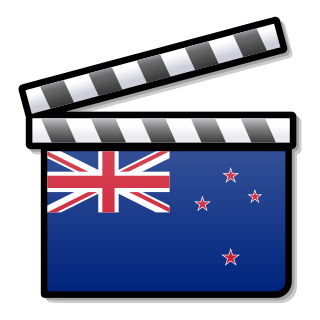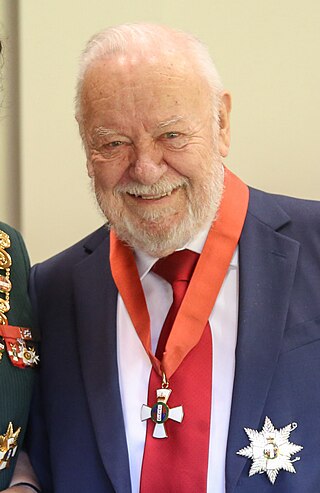
New Zealand cinema can refer to films made by New Zealand-based production companies in New Zealand. However, it may also refer to films made about New Zealand by filmmakers from other countries. Due to the comparatively small size of its film industry, New Zealand produces many films that are co-financed by overseas companies.

Merry Christmas, Mr. Lawrence, also known as Furyo, is a 1983 war film co-written and directed by Nagisa Ōshima, co-written by Paul Mayersberg, and produced by Jeremy Thomas. The film is based on the experiences of Sir Laurens van der Post as a prisoner of war in Java during World War II, as depicted in his books The Seed and the Sower (1963) and The Night of the New Moon (1970). It stars David Bowie, Ryuichi Sakamoto, Takeshi Kitano and Jack Thompson; Sakamoto also composed and played the musical score including the vocal version of the main theme "Forbidden Colours", with lyrics written and sung by David Sylvian.

Goodbye Pork Pie is a 1981 New Zealand comedy film directed by Geoff Murphy, co-produced by Murphy and Nigel Hutchinson, and written by Geoff Murphy and Ian Mune. The film was New Zealand's first large-scale local hit. One book described it as Easy Rider meets the Keystone Cops.

Sir Ian Barry Mune is a New Zealand character actor, director, and screenwriter. His screen acting career spans four decades and more than 50 roles. His work as a film director includes hit comedy Came a Hot Friday, an adaptation of classic New Zealand play The End of the Golden Weather, and What Becomes of the Broken Hearted?, the sequel to Once Were Warriors.

Roger Lindsey Donaldson is an Australian and New Zealand film director, screenwriter, and producer. His 1977 debut film, Sleeping Dogs, is considered landmark work of New Zealand cinema, as one of the country’s first films to attract large-scale critical and commercial success. He has subsequently directed 17 feature films, working in Hollywood and the United Kingdom, as well as his native country.

David Charles Lawrence known as Bruno Lawrence was an English-born musician and actor, who was active in the industry in New Zealand and Australia.

Raetihi, a small town in the centre of New Zealand's North Island, is located at the junction of State Highways 4 and 49 in the Manawatū-Whanganui region. It lies in a valley between Tongariro and Whanganui National Parks, 11 kilometres west of Ohakune's ski fields.
The Sir Julius Vogel Awards are awarded each year at the New Zealand National Science Fiction Convention to recognise achievement in New Zealand science fiction, fantasy, horror, and science fiction fandom. They are commonly referred to as the Vogels.

The World's Fastest Indian is a 2005 New Zealand biographical sports drama film based on the Invercargill, New Zealand speed bike racer Burt Munro and his highly modified 1920 Indian Scout motorcycle. Munro set numerous land speed records for motorcycles with engines less than 1,000 cc at the Bonneville Salt Flats in Utah in the late 1950s and into the 1960s. The film stars Anthony Hopkins, and was produced, written, and directed by Roger Donaldson.
The following lists events that happened during 1983 in New Zealand.
The following lists events that happened during 1985 in New Zealand.

Horopito is a locality in the North Island of New Zealand. It lies on State Highway 4 between the village of National Park and the town of Raetihi.

Taika David Cohen, known professionally as Taika Waititi, is a New Zealand filmmaker, actor and comedian. He is known for directing quirky comedy films and has expanded his career as a voice actor and producer on numerous projects. He has received numerous accolades including an Academy Award, a BAFTA Award and a Grammy Award, as well as two nominations for the Primetime Emmy Award. Time magazine named him one of the 100 most influential people in the world in 2022.
Greer Robson is a New Zealand television actress well known for her role in the television drama Shortland Street.
Super City is a television comedy series from New Zealand starring Madeleine Sami and directed by Taika Waititi. Season 1 premiered on the TV3 network in 2011. The series was picked up by the American Broadcasting Company in 2012. It opened with a 24 percent share of the 25–54 age bracket, placing it 11th place on TV3's rating table for the week. The second season, directed by Oscar Kightley, premiered on 26 July 2013.

Rachel Jessica Te Ao Maarama House is a New Zealand actress and director. She has received numerous accolades including an Arts Laureate, NZ Order of Merit, 'Mana Wahine' from WIFT NZ and Te Waipuna a Rangi for her contributions as an actor and director.

Tomas Walsh is a New Zealand athlete who competes mainly in the shot put. He is the current national record holder both outdoors and indoors for the event. His personal best of 22.90 m, set in Doha, 5 October 2019, is also the Oceanian record and makes him the sixth best shot putter in history.

Julian Dennison is a New Zealand actor. He debuted in the 2013 film Shopping, for which he won the English Film and Television Award for Best Supporting Actor. He is known for his roles as Ricky Baker in Hunt for the Wilderpeople (2016), the highest-grossing New Zealand film in history, as Russell "Firefist" Collins in Deadpool 2 (2018), and as Belsnickel in The Christmas Chronicles 2. In 2021, Dennison starred as Josh Valentine in Godzilla vs. Kong. and in 2023 he played the lead role in Uproar as Josh Waaka.

Hunt for the Wilderpeople is a 2016 New Zealand adventure comedy-drama film written and directed by Taika Waititi, whose screenplay was based on the book Wild Pork and Watercress by Barry Crump. Sam Neill and Julian Dennison play "Uncle" Hector and Ricky Baker; a father figure and foster son who become the targets of a manhunt after fleeing into the New Zealand bush. Carthew Neal, Leanne Saunders, Matt Noonan, and Waititi produced the film.

Smash Palace is the first extended play by New Zealand singer and songwriter Sharon O'Neill. The EP is a soundtrack to the 1982 Roger Donaldson film, Smash Palace.















